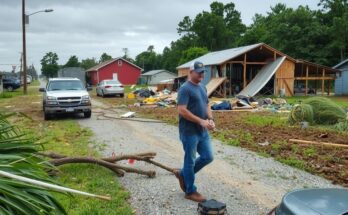Hurricane Helene has resulted in over 160 fatalities across the southeastern United States, causing severe flooding and infrastructure damage. Ongoing rescue efforts are underway amid extensive humanitarian needs, while federal assistance is being mobilized for long-term recovery. The storm raises significant concerns regarding future climatic events and the need for enhanced disaster preparedness.
More than 160 fatalities have been confirmed following the devastating impact of Hurricane Helene, marking it as one of the deadliest storms to affect the United States in recent history. The hurricane wreaked havoc on the southeastern states, leading to extensive flooding, destruction of communities, and widespread power outages. Rescue operations are still ongoing, with aid being delivered through airdrops and coordinated efforts by volunteers. The federal government has indicated that rebuilding and recovery could span several years. In light of the disaster, President Joe Biden is scheduled to visit North Carolina, which has been significantly impacted, while Vice President Kamala Harris will travel to neighboring Georgia. The political implications of the storm are evident, given that both states are critical swing regions in the upcoming presidential election. This situation intensified when Republican presidential candidate Donald Trump made his own appearance in Georgia earlier in the week. Hurricane Helene made landfall as a Category 4 hurricane, the strongest recorded to impact Florida’s Big Bend, before transitioning to a tropical storm as it moved through adjacent states. The unusual size of the storm’s rainclouds, combined with prolonged rainfall, exacerbated the situation, particularly on already saturated grounds from prior precipitation. According to CBS News, the reported death toll of 162 spans across six states: North Carolina, South Carolina, Georgia, Florida, Tennessee, and Virginia. Notably, nearly half of the fatalities occurred in North Carolina, where six months’ worth of rain fell within a brief duration, resulting in substantial destruction of infrastructure. The mountainous regions of North Carolina experienced particularly severe rainfall, prompting the washing away of homes and bridges. An emergency official stated that the state endured “biblical devastation.” A volunteer noted the heartbreak of individuals who had previously lost everything in Hurricane Katrina and are now experiencing a similar tragedy nearly two decades later, lamenting on the severe loss endured.
Hurricane Helene’s impact on the southeastern United States is a stark reminder of the destructive power of natural disasters exacerbated by climate change. As the region grapples with the aftermath of the storm, reports indicate that the extent of damage may take years to rectify. With a significant number of individuals still unaccounted for, the ongoing search and rescue operations highlight the urgency of humanitarian efforts. The storm’s intensity has raised concerns regarding future weather events, particularly as the Atlantic hurricane season continues through November. The science surrounding climate change increasingly suggests a correlation between human activities and intensified weather patterns, necessitating comprehensive disaster preparedness and response strategies.
In summary, Hurricane Helene has claimed over 160 lives and left many others missing as it devastated several southeastern states. The long-term recovery efforts are projected to be extensive, underscoring the need for federal assistance and community resilience. The implications of this disaster extend beyond immediate relief, emphasizing the urgency for climate change dialogue and proactive measures to mitigate future risks. As the Atlantic hurricane season presses on, vigilance remains paramount in safeguarding affected communities.
Original Source: www.bbc.com




